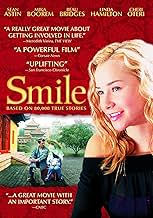This movie isn't about the character makeover that Katie has or the facial makeover that Lindsay has. I kept on wondering why they would call the movie Smile ! I had my answer. "Smile" is about the ability to genuinely smile, to smile for something that doesn't go through you, to smile with mushy emotions inside, to smile with tears in your eyes, to smile at the happiness of someone besides yourself ! Its what you would do while you watched "Smile". They have also probably chosen the perfect tag-line for this movie. Watch the movie and you will find out why !
I give this movie all its rating because of Lindsay and her dad and everything that revolves around them. Very very touching to watch a father sacrifice everything for the love of an adopted child. Cinematography too was excellent. The scenic countryside holding hands with the pleasant music score adds to the feel good touch of brilliantly done scenes such as the father and child dancing etc.
The initial chunk of the movie is a lil overdone potpourri of characters. Character development was essential, but it spills over into more of a striking contrasting difference between the lives of two girls born on the same day. It puts forth a wrong perspective which could well and truly stand in line with the archaic stereotype of lives in developing countries. They could also have gone easy on the last set of photo stills to don the movie screen. It tends to give a lil bit of the "true story" thing away !
Given its pros and cons, I would certainly recommend this movie even if its a date movie !
































